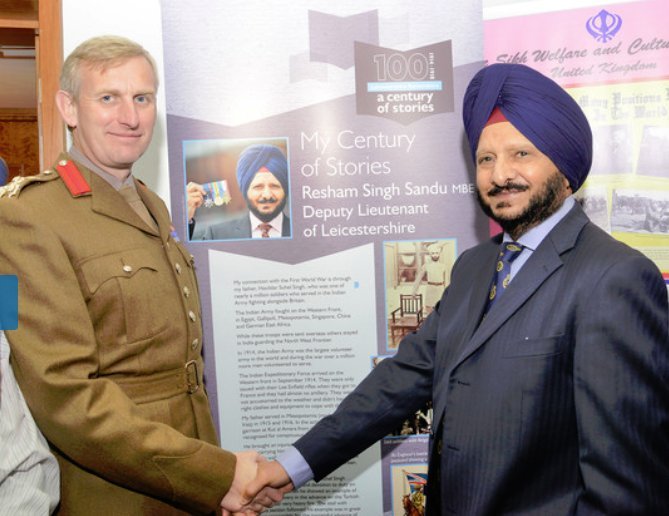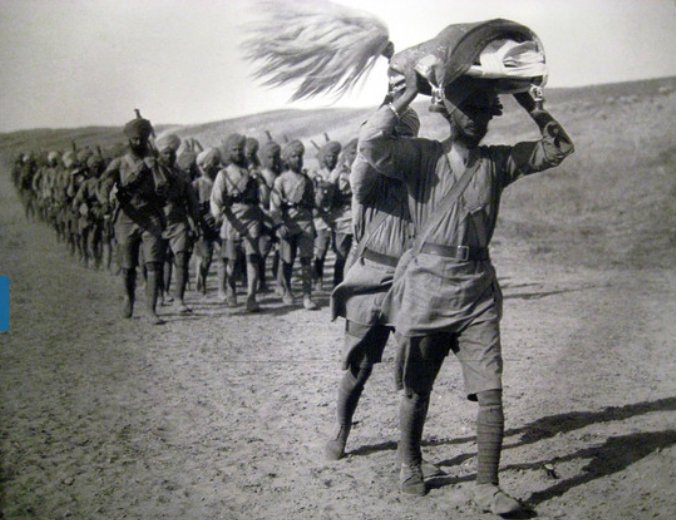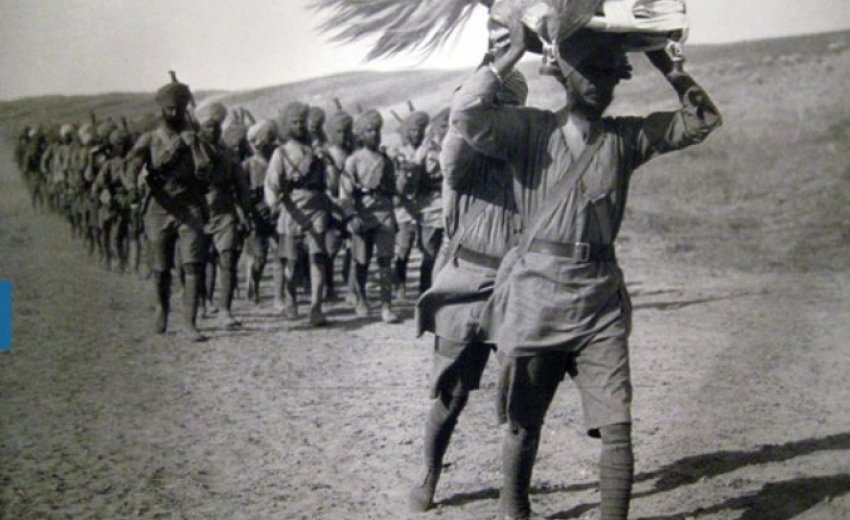 |
| Brigadier Richard Stanford with Resham Singh Sandhu |
October 20, 2014: People from communities across the city and county came together to remember the sacrifices of Sikh and Commonwealth servicemen 100 years ago.
The contribution made by troops from far flung reaches of the British Empire was commemorated at a public lecture at the weekend.
More than 300 people joined veterans and civic dignitaries to hear Invisible Heroes: The Sikhs and Commonwealth Soldiers in World War One.
Hosted by the University of Leicester, the event was organised by the city’s Sikh Welfare and Cultural Society to mark the centenary of the outbreak of hostilities.
Its chairman, Resham Singh Sandhu, Deputy Lieutenant of Leicestershire, said: “I was really surprised to see so many people come along.
“They were from all communities in the city and county, representing all age groups and backgrounds.
“It was extremely heartening to see.”
 |
| A column of Sikh troops marches behind thethe Guru Granth Sahib holy book in Mesopotamia |
Mr Sandhu’s father was one of 130,000 Sikhs who saw active service during the conflict – on the Western Front and other theatres of war in the Mediterranean, Africa and Middle East.
He said: “My father, Sohel Singh, served in Mesopotamia in modern day Iraq.
“I still cherish the campaign medals he won.”
Thousands of soldiers from the British Empire’s south Asian colonies were killed in the conflict.
And despite accounting for just two per cent of the population of British India, Sikhs made up more than 20 per cent of the British Indian Army at the outbreak of hostilities.
Known for their bravery, honour and loyalty, they were dubbed the ‘Lions of the Great War’.
They used traditional weapons on the battlefield and the Sikh holy book, the Guru Granth Sahib, was often carried at the head of a marching battalion.
Of the Sikh’s who fought, 61,000 died and a further 68,000 were wounded.
Mr Sandhu said: “On the centenary, it is important we remember all those men, and women, who contributed to victory.
“Unfortunately, the part played by Sikh and Commonwealth troops has often been overlooked.
“That’s why we organised this event in Leicester, to recognise these people, commemorate our shared past and look to the future together.”
The lecture was introduced by Dr Rami Ranger, MBE, chairman, the British Sikh Association.
Speakers included writer and historian Bobby Singh Bansal and retired Royal Air Force officer Balbir Singh Flora, from Leicester.
Councillor Manjula Sood, assistant city mayor for community involvement and chairman of the Leicester Council of Faiths, said: “It was an extremely poignant and moving event, both illuminating and inspiring. These people travelled many thousands of miles to fight for the independence and freedom we enjoy today.
“They left their homes and families behind and many would never return.
“One of the most touching moments for me was meeting a family who had brought along photographs, medals and even the uniform their grandfather.
“It was obvious how proud they are of him, and how much it means to them still after all these years.”
Guest of honour, Brigadier Richard Stanford, spoke of the proud tradition of Sikh and Commonwealth forces in the British Army, one that it is keen to re-cultivate.
Mr Sandhu said: “We have such a proud tradition in the British Army, it is a shame that this has fallen by the wayside.
“Brigadier Stanford emphasised that young servicemen and women are welcomed in our armed forces, where they can pursue a wide range of interesting and fulfilling careers, which was a very positive thing to hear.”
A bucket collection held on the day raised £630 for ABF The Soldiers Charity.
